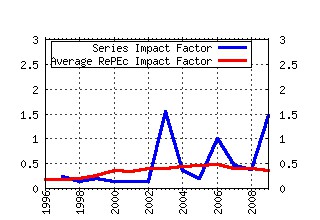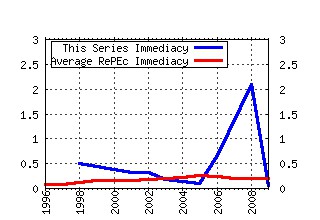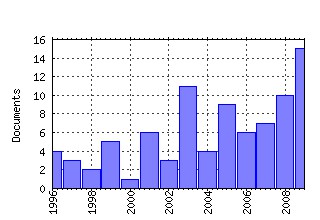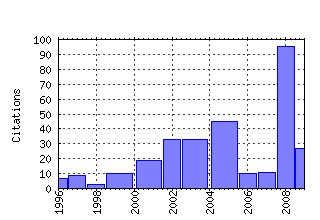
|
|
|||||||||||||||||||||||||||||||||||||||||||||||||||||||||||||||||||||||||||||||||||||||||||||||||||||||||||||||||||||||||||||||||||||||||||||||||||||||||||||||||||||||||||||||||
Research Memoranda Raw citation data, Impact Factor, Immediacy Index, Published documents, Citations received, , Most cited papers , Recent citations and documents published in this series in EconPapers.
Most cited documents in this series: (1) RePEc:dgr:umaror:2008001 The Economics and Psychology of Personality Traits (2008). (2) RePEc:dgr:umaror:2002003 Do Older Workers Have More Trouble Using a Computer Than Younger Workers? (2002). (3) RePEc:dgr:umaror:2005004 Educational Opportunities and the Role of Institutions (2005). (4) RePEc:dgr:umaror:2003005 Fitting to the Job: the Role of Generic and Vocational Competencies in Adjustment and Performance (2003). (5) RePEc:dgr:umaror:2009006 Individual Risk Attitudes: Measurement, Determinants and Behavioral Consequences (2009). (6) RePEc:dgr:umaror:2009005 Gender Differences in Risk Aversion and Ambiguity Aversion (2009). (7) RePEc:dgr:umaror:2001005 Computers, Skills and Wages (2001). (8) RePEc:dgr:umaror:2005002 People People: Social Capital and the Labor-Market Outcomes of Underrepresented Groups (2005). (9) RePEc:dgr:umaror:1999005 Skills and low pay: upgrading or overeducation? (1999). (10) RePEc:dgr:umaror:1997002 The Measurement of Overeducation and Undereducation: Self-Report vs. Job Analyst Method (1997). (11) RePEc:dgr:umaror:2003003 The Diffusion of Computers and the Distribution of Wages (2003). (12) RePEc:dgr:umaror:2001003 Skills Obsolescence: Causes and Cures (2001). (13) RePEc:dgr:umaror:2006006 The Role of Noncognitive Skills in Explaining Cognitive Test Scores (2006). (14) RePEc:dgr:umaror:2003001 An investigation into the role of human capital competences and their pay-off (2003). (15) RePEc:dgr:umaror:2005008 Does Training Trigger Turnover...or Not? (2005). (16) RePEc:dgr:umaror:2003004 Schooling Quality in Eastern Europe: Educational Production During Transition (2003). (17) RePEc:dgr:umaror:2007006 Skill Obsolescence, Lifelong Learning and Labor Market Participation (2007). (18) RePEc:dgr:umaror:2009003 Shattered Dreams: The Effects of Changing the Pension System Late in the Game (2009). (19) RePEc:dgr:umaror:2001004 What happens when agent T gets a computer? (2001). (20) RePEc:dgr:umaror:2011005 Retirement and Subjective Well-Being (2011). (21) RePEc:dgr:umaror:1996001 The impact of human capital on labour productivity in manufacturing sectors of the European Union (1996). (22) RePEc:dgr:umaror:2003008 Changes in womens willingness to work in a tightening labour market: the impact of preferences, wages and individual characteristics (2003). (23) RePEc:dgr:umaror:2007007 Human Capital Depreciation during Family-related Career Interruptions in Male and Female Occupations (2007). (24) RePEc:dgr:umaror:2008006 What affects international migration of European science and engineering graduates? (2008). (25) RePEc:dgr:umaror:2007005 International Differences in the Family Gap in Pay: the Role of Labor Market Institutions (2007). (26) RePEc:dgr:umaror:1997001 Differential effects of colleges on the labour market success of their graduates (1997). (27) RePEc:dgr:umaror:1999001 Do employees with Flexible Contracts receive less Training? (1999). (28) RePEc:dgr:umaror:2005007 Shifts and Twists in the Relative Productivity of Skilled Labor (2005). (29) RePEc:dgr:umaror:1996003 The Relation between the Wage, Job-related Training and the Quality of the Match between Occupations and the Types of Education (1996). (30) RePEc:dgr:umaror:2009012 The effects of pension rights and retirement age on training participation: Evidence from a natural experiment (2009). (31) RePEc:dgr:umaror:2005001 Student time allocation, the learning environment and the acquisition of competencies (2005). (32) RePEc:dgr:umaror:2006005 The effects of higher education programme characteristics on allocation and performance of the graduates: a European view (2006). (33) RePEc:dgr:umaror:1998002 Clustering Educational Categories in a Heterogeneous Labour Market (1998). (34) RePEc:dgr:umaror:2008010 Repeated Job Quits: Stepping stones or learning about quality? (2008). (35) RePEc:dgr:umaror:1996002 Upgrading in the European Union (1996). (36) RePEc:dgr:umaror:2011004 Identification Problems in Personality Psychology (2011). (37) RePEc:dgr:umaror:2006001 Is there a link between economic outcomes and genetic evolution? Cross-country evidence from the major histocompatibility complex (2006). (38) RePEc:dgr:umaror:2008004 Why do Part-Time Workers invest less in Human Capital than Full-Timers? (2008). (39) RePEc:dgr:umaror:2010002 You get what you pay for: Incentives and Selection in the Education System (2010). (40) RePEc:dgr:umaror:2007001 Interpersonal Styles and Labor Market Outcomes (2007). (41) RePEc:dgr:umaror:1999002 Modelling Replacement Demand: A Random Coefficient Approach (1999). (42) RePEc:dgr:umaror:2010011 Satisfaction with job and income among older individuals across European countries (2010). (43) RePEc:dgr:umaror:2010001 Does Retirement Affect Cognitive Functioning? (2010). (44) RePEc:dgr:umaror:2010010 Why do low-educated workers invest less in further training? (2010). (45) RePEc:dgr:umaror:2010007 Cross-country differences in graduate overeducation and its persistence (2010). (46) RePEc:dgr:umaror:2005006 Time Discounting and the Body Mass Index (2005). (47) RePEc:dgr:umaror:2009009 The role of geographic mobility in reducing education-job mismatches in the Netherlands (2009). (48) RePEc:dgr:umaror:2003011 Do Low-Skilled Youngsters get Better Jobs in Countries where Internal Labour Markets Dominate? (2003). (49) RePEc:dgr:umaror:2006003 Skill Transferability Regret and Mobility (2006). (50) RePEc:dgr:umaror:1998001 The Dutch Factor Content of Human and Physical Capital: A Test of the HOV Model (1998). Recent citations received in: | 2009 | 2008 | 2007 | 2006 Recent citations received in: 2009 (1) RePEc:cdx:dpaper:2009-19 WHO MAKES A GOOD LEADER? COOPERATIVENESS, OPTIMISM AND LEADING-BY-EXAMPLE (2009). Discussion Papers Recent citations received in: 2008 (1) RePEc:ces:ifodic:v:6:y:2008:i:2:p:3-8 The Case for Investing in Disadvantaged Young Children (2008). CESifo DICE Report (2) RePEc:cpb:discus:113 The effect of childhood conduct disorder on human capital (2008). CPB Discussion Paper (3) RePEc:cpb:discus:114 Why are criminals less educated than non-criminals? Evidence from a cohort of young Australian twins (2008). CPB Discussion Paper (4) RePEc:dgr:unumer:2008024 Serving low-income markets: Rethinking Multinational Corporations Strategies (2008). UNU-MERIT Working Paper Series (5) RePEc:dgr:unumer:2008030 Strategic motivations for Sino-Western alliances: a comparativeanalysis of Chinese and Western alliance formation drivers. (2008). UNU-MERIT Working Paper Series (6) RePEc:dgr:unumer:2008031 Changing Configuration of Alternative Energy Systems (2008). UNU-MERIT Working Paper Series (7) RePEc:dgr:unumer:2008032 Promoting clean technologies: The energy market structure crucially matters. (2008). UNU-MERIT Working Paper Series (8) RePEc:dgr:unumer:2008033 Local Knowledge Spillovers, Innovation and Economic Performance in Developing Countries: A discussion of alternative specifications (2008). UNU-MERIT Working Paper Series (9) RePEc:dgr:unumer:2008034 Wage effects of R&D tax incentives:Evidence from the Netherlands (2008). UNU-MERIT Working Paper Series (10) RePEc:dgr:unumer:2008036 Radical versus Non-Radical Inventions (2008). UNU-MERIT Working Paper Series (11) RePEc:dgr:unumer:2008040 A Multilevel Analysis of Innovation in Developing Countries (2008). UNU-MERIT Working Paper Series (12) RePEc:dgr:uvatin:20080073 If you are so smart, why arent you an Entrepreneur? (2008). Tinbergen Institute Discussion Papers (13) RePEc:diw:diwwpp:dp836 The Returns to Cognitive Abilities and Personality Traits in Germany (2008). Discussion Papers of DIW Berlin (14) RePEc:hhs:ifauwp:2008_025 One size fits all? The effects of teacher cognitive and non-cognitive abilities on student achievement (2008). Working Paper Series (15) RePEc:hhs:iuiwop:0779 One Size Fits All? The Effects of Teacher Cognitive and Non-cognitive Abilities on Student (2008). Working Paper Series (16) RePEc:iae:iaewps:wp2008n19 Discrete Heterogeneity in the Impact of Health Shocks on Labour Market Outcomes (2008). Melbourne Institute Working Paper Series (17) RePEc:iza:izadps:dp3648 If You Are So Smart, Why Arent You an Entrepreneur? Returns to Cognitive and Social Ability: Entrepreneurs versus Employees (2008). IZA Discussion Papers (18) RePEc:nbr:nberwo:14064 Schools, Skills, and Synapses (2008). NBER Working Papers (19) RePEc:ucd:wpaper:200819 Psychological and Biological Foundations of Time Preference: Evidence from a Day Reconstruction Study with Biological Tracking (2008). Working Papers (20) RePEc:ucn:wpaper:200819 Psychological and Biological Foundations of Time Preference - Evidence from a Day Reconstruction Study with Biological Tracking (2008). Working Papers (21) RePEc:zbw:zewdip:7505 The Effect of Early Noncognitive Skills on Social Outcomes in Adolescence (2008). ZEW Discussion Papers Recent citations received in: 2007 Recent citations received in: 2006 (1) RePEc:cpr:ceprdp:6022 The Evolution of Entrepreneurial Spirit and the Process of Development (2006). CEPR Discussion Papers (2) RePEc:dgr:unumer:2006045 Interpersonal Styles and Labor Market Outcomes (2006). UNU-MERIT Working Paper Series (3) RePEc:iza:izadps:dp2466 Interpersonal Styles and Labor Market Outcomes (2006). IZA Discussion Papers (4) RePEc:ner:maastr:urn:nbn:nl:ui:27-13472 Competence indicators in academic education and early labour market success of graduates in health sciences. (2006). Open Access publications from Maastricht University Warning!! This is still an experimental service. The results of this service should be interpreted with care, especially in research assessment exercises. The processing of documents is automatic. There still are errors and omissions in the identification of references. We are working to improve the software to increase the accuracy of the results. Source data used to compute the impact factor of RePEc series. |
|||||||||||||||||||||||||||||||||||||||||||||||||||||||||||||||||||||||||||||||||||||||||||||||||||||||||||||||||||||||||||||||||||||||||||||||||||||||||||||||||||||||||||||||||




